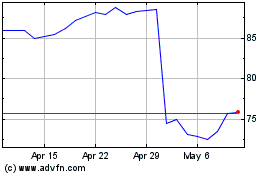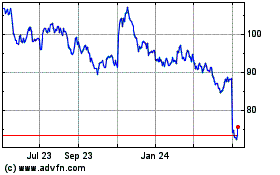For Indonesia, a Grisly Reminder of Terror's Tenacity
January 14 2016 - 7:40AM
Dow Jones News
Indonesia for years has worked to shed its image as a hub of
Islamist terrorists that stuck after the deadly Bali nightclub
bombings in 2002, killing more than 200 people.
The multiple gun and bomb attacks in Jakarta on Thursday, which
left at least seven people dead, will refocus global attention on
the country's long-standing problem with religious extremism while
also potentially representing a new type of threat.
The perpetrators of Thursday's attacks, which appeared to target
a downtown mall with outlets of Starbucks and Burger King, have
links to Islamic State, according to Jakarta police. Homegrown
militants—who police say are behind the assaults—have now found a
new rallying point.
Officials said the insurgents came from an Islamic State-linked
group in Solo, a city on Indonesia's main island of Java, and had
been in contact with terrorists in Syria. "We have detected
communications between a Syrian group and the Solo group," Deputy
Police Chief Budi Gunawan said.
Earlier attacks in Indonesia—which included the Bali nightclub
bombings in 2002 that killed mostly Western tourists, two separate
bombings on the J.W. Marriott hotel in Jakarta and an attack on the
Australian Embassy—were carried out by Jemaah Islamiyah, a
Southeast Asian terrorist group with links to al Qaeda.
Many of that group's members had studied in religious schools on
Indonesia's main island of Java and received training in
Afghanistan. Indonesia's antiterrorism police went a long way to
dismantling the network, killing scores of militants, including the
group's Malaysian leader in a shootout at a rural Indonesian
farmhouse in 2009.
Indonesia also jailed Abu Bakar Bashir, an Indonesian cleric who
acted as Jemaah Islamiyah's spiritual head and had founded an
extremist religious school.
But the network, while much degraded, has continued to live on,
according to the Institute for Policy Analysis of Conflict, an
Indonesia-based nonprofit group that tracks local terrorist
networks. And many of Indonesia's active militants today are linked
to the same network of religious schools that fed militants to
Jemaah Islamiyah, the institute said in a recent report.
Instead of training in Afghanistan, those militants today are
traveling to fight for Islamic State in Syria and Iraq, according
to the institute. The pro-Islamic State groups in Indonesia "have
emerged from existing radical networks that have never gone away,"
the report said.
"They may have morphed, realigned, regrouped and regenerated but
they are not new."
For President Joko Widodo, who is already grappling with a
moribund economy, the re-emergence of the specter of terrorism will
complicate his attempts to paint the country as modernizing nation
that is open for investment. The Muslim-majority nation of about
250 million is currently working on a major revamp of
foreign-investment rules designed to attract more overseas
companies.
Indonesia economy is growing below 5%, slower than a decade
average of 6%, as prices for commodities like coal and nickel
remain in the doldrums due to China's slowing economic growth. On
Thursday, Bank Indonesia cut interest rates for the first time in
11 months to help prop up the struggling economy.
The rupiah, already one of the world's worst performing
currencies—a reflection of its over-dependence on swooning
commodity markets—fell 1% on Thursday. It is down 9% over the past
12 months, although it had been staging a modest recovery of late,
in part due to belief in Mr. Widodo's reformist zeal.
He realizes that Indonesia has failed to attract the same levels
of investment as low-cost Asian rivals like Vietnam. Investors have
been put off by poor infrastructure and corruption in the
bureaucracy and Mr. Widodo, a former governor of Jakarta with a
reputation as "Mr. Clean," is arguing that his administration is
tackling these issues. The rebirth of the terrorist threat is
likely to make his case that much harder to argue.
Thursday's attacks are also a blow for Indonesia's U.S.-trained
special antiterrorism police, who had won praise in recent years
for breaking up terrorist rings and averting a major attack on
Indonesian soil since 2009. In recent months, the police have
mounted attacks on safe houses in Poso, a remote area on
Indonesia's Sulawesi island.
Write to Tom Wright at tom.wright@wsj.com
(END) Dow Jones Newswires
January 14, 2016 07:25 ET (12:25 GMT)
Copyright (c) 2016 Dow Jones & Company, Inc.
Starbucks (NASDAQ:SBUX)
Historical Stock Chart
From Mar 2024 to Apr 2024

Starbucks (NASDAQ:SBUX)
Historical Stock Chart
From Apr 2023 to Apr 2024
